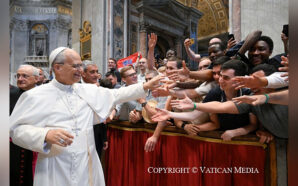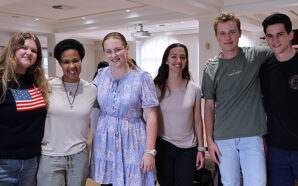Book Review – Richard Leonard SJ, Hatch Match & Dispatch: A Catholic Guide to the Sacraments, Paulist Press, ISBN 9780809106509
The businesslike ampersand in the title of Fr Richard Leonard’s recent book introduces its tone. Hatch Match & Dispatch displays his characteristic mixture of urgency, jauntiness, clarity of detail, nostalgia for the old and passion for the new. Those who have heard him speak on Catholic themes will be delighted to find familiar stories and jokes scattered through the book.
It is difficult to write engagingly about Sacraments. Central though they may be to us personally and in the life of the Catholic Church, we need to sail your way through a Sargasso Sea of ritual detail, language no longer in currency, complex history and the detritus of a catechesis that was often dominated by law. It is easy to forget our compass bearings while we are busy avoiding hillocks of kelp.
Like a prudent Admiral, Leonard maps his course first on the larger chart of the sacramental world. He follows Vatican II and Pope Francis in setting the sacraments first in the preaching of the Gospel and only then in the inner life of individual Catholics. Jesus is drawn on less as the person who established the Sacraments than as the Jesus of the Gospels drawing, inspiring and challenging us through them. Sacraments are not a space of constraint but a place of freedom and hospitality.
He draws on Pope Francis’ striking description of the Church as a field hospital, suggesting that sacraments are about healing and forgiveness for people who are wounded. They are not reserved for people of untroubled virtue. This image leads him to emphasise less the demands for reverence and holiness in the celebration of the sacraments than on the inherent human messiness and frailty.
In commending his account of the Sacraments he tells earthy stories of good Pastoral care in the celebration of the Sacraments before the Reforms of Vatican II and of rigid behaviour by clergy in the administration of the Sacraments – refusing to baptise children or refusing to adapt the ritual in appropriate ways to the situation of the recipients. Such stories complement his lucid and economical summaries of the history and church teaching about each of the sacraments. He also treats deftly controversial questions, such as the denial of the Eucharist to people who are divorced and remarried and the ordination of women.
One of the challenges in imagining and celebrating Sacraments is to see what they have to do with life beyond the church and beyond their immediate celebration. Leonard draws effectively on his interest in media and films to list popular films whose themes illuminate the connection of the sacraments to the public world. They also bring to life the ritual details we might otherwise miss.
This leads him necessarily to face a large question about sacraments, and indeed about Jesus’ earthly life. In them does God take ordinary things of our world, like the bread and wine, oil, water and words, set them apart from our daily world, and so make them holy? Or does God tell us in the sacraments that there are no ordinary things in our world, but that water, bread, wine and words are chosen because God created them holy? The answer to these questions is surely that both ways of speaking are true and complement one another. But all of us lean one way or the other. Leonard leans towards the inner holiness of the world, as do I.
A touchstone is the splendid exhortation to priests, a favourite of Mother Theresa and printed in many sacristies, ‘Priest of Jesus Christ, celebrate this Holy Mass as if it were your first Mass, your last Mass, your only Mass.’ If, as Fr Leonard does, we emphasise the way in which the Sacraments affirm the holiness of our frail bodies and of our world, we might rather pray that we would celebrate our last Mass as if it were this Mass, expressing the wonder of God’s grace coming through dusty human beings and ritual that are also immortal diamond.
Fr Andrew Hamilton SJ writes for Jesuit Communications and Jesuit Social Services.








